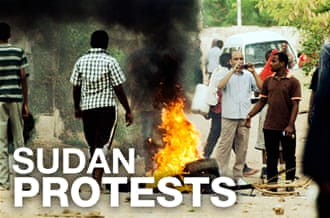Sudan protesters aim to ‘elbow out’ Bashir
by editor | 2012-07-01 8:58 am
![]()
Citizens voice their anger ahead of Friday’s “Licking your elbow” protests – a metaphor for achieving the impossible
Fatma Naib
[1] 
‘Licking one’s elbow’ is a Sudanese metaphor for achieving the impossible
Street protests have entered their second week in Sudan, and activists have called for mass demonstrations on Friday, June 29. The demonstrations have been dubbed “licking your elbow” protests, referring to a Sudanese metaphor for achieving the impossible.
They have also called for a general strike day on June 30, the 23rd anniversary of Sudanese President Omar al-Bashir’s National Congress Party coming to power.
Many Sudanese hope this will be the country’s third revolution. The first one was in 1964, when 20-year-old student activist Ahmad al-Qurashi was shot dead by security forces, sparking a mass non-violent movement and toppling General Abood. And President Gaafar al-Nimeiry was removed from power following protests that led to a military coup in 1985.
The current protest movement began on June 16, when female university students in Khartoum demonstrated against government austerity measures that increased the cost of student housing.
 [2] Follow our in-depth coverage of anti-government demonstrations
[2] Follow our in-depth coverage of anti-government demonstrations
Online social networks are being used by activists to communicate and organise anti-government protests, and citizen journalists like Usamah Mohd – who goes by the Twitter handle @simsimt – has been posting advice on
Usamah was arrested on June 22, after he appeared on Al Jazeera English’s show The Stream. His whereabouts are still unknown.
Many Sudanese youth think that this is the moment that change will come. Al Jazeera spoke to several of these youth who support the protests.
Due to the recent government clampdown, some of the people asked that their identities be kept anonymous.
Hammour Ziada, 33, journalist and writer, Cairo
I am supporting the protests because I believe that after 23 years of al-Bashir’s rule, it is time for change. This government had 23 years of wasted opportunities where they could have improved the economy and civil liberties.
On Saturday I will stand outside the Sudanese embassy in Cairo in solidarity with my fellow brothers and sisters back home.

[The] “Licking your Elbow Friday” title comes from a saying that Nafi Ali Nafi, the vice-president of the ruling National Congress Party (NCP), used to say. Nafi is known for his arrogance and tough stance on protesters and the opposition.
He is famous for the saying “if anyone dares to hit the streets and attempt to remove the regime, the day they lick their elbows is the day they will topple the regime”.
In one poster it says: “We will lick our elbows, Nafi, and yes, it is personal”.
Sudan is on the verge of bankruptcy and lack of freedom and I hold the whole government responsible for this. This government is a religious, military-minded one, and the military mind does not understand democracy or dialogue. They only believe in the rule by force and obeying order.
Bashir’s last speech where he said that there is no “Arab Spring” in Sudan – it reminded me of Gaddafi speeches because he repeated similar rhetoric by reiterating the love of the people of him, and the way he dehumanised the protesters by calling them “shozoz afaq”, “aliens”, and “homosexuals”.
I don’t expect Friday to bring an immediate change and attract huge numbers similar to Tahrir Square, simply because the way we protest in Sudan is different.
We don’t gather in major squares, based on previous experiences with the police during protests. By gathering in huge numbers in open spaces we become an easier target. So we prefer small groups spread all over the city; this creates confusion for the police and it exhausts their resources quicker.
I don’t think that it is accurate to describe what is happening in Sudan as “Arab Spring”. We may be similar in our demands for freedom but the terminology does not represent Sudan, because we are not just Arabs.
We can’t predict what will happen on Friday. But this is definitely the start of a revolution. … I hope the government will put down their arms and leave before it’s too late, because there is no holding the masses back once they explode.
Waffa al-Amin, 26, activist, Khartoum
I support the protests because our main goal is to remove the regime that has been mismanaging the country by its failed policies, that have left the country in total disarray.
“We coordinate and organise where the protests will take place. We don’t gather in big open spaces, we keep to small groups and spread all over the city.“
– Waffa al-Amin
We are sick and tired of the corruption that has become the thumb of rule here, and lack of freedom, civil liberty, and censorship.
I have been taking part in protests since I was a student, and it is harder when you are a woman because you always risk being sexually harassed by security forces. We communicate mainly as activists by social media like Facebook and Twitter.
We co-ordinate and organise where the protests will take place. We don’t gather in big open spaces, we keep to small groups and spread all over the city.
This way we exhaust the security forces because they have to chase us, and nighttime is the also best time because they are not prepared for that.
For those that are not online we rely on spreading the message by word of mouth. In each neighbourhood we spread the word to the people we know and they pass it further.
I am going to take part in this weekend protests and I know that I am risking getting arrested, but it is worth it. I am fighting for a Sudan where we can be led by an elected body and the rule of law is the only rule.
I don’t expect Friday to have huge turnout, and security forces will probably clamp down, but we will continue until we topple the regime. We know that the road is long and we are ready.
Mohammed el-Jack, 21, doctor, Khartoum
I support the demonstration because the current system remained for 23 years suppressing the people, and was the direct cause of the separation of the South and all the other conflicts in other parts in Sudan.
“If Friday doesn’t turn out the way we want, then we will continue until we achieve our goals.“
– Mohammed el-Jack
The government’s failed economic policies have brought misery on us as people. If we let them continue we will lose whatever that is left of Sudan.
I am aware of the constant threat of being arrested for taking part in the protests, but there are no other options than civil struggle and fight the regime by protesting in the streets, no matter what.
If we didn’t do that, then the government’s continued failure will lead us to civil wars. We hope that most sectors of the population will come out on Friday so we can send a strong message to the government that it is time to leave.
If Friday doesn’t turn out the way we want, then we will continue until we achieve our goals. In the end, sooner or later, dictatorship always falls.
We are not underestimating the regime’s brutality and clampdown on protesters, but I doubt that they will kill anyone in the protests – because they will not repeat the same mistake of al-Qurashi who was killed in October 1964.
His death by the guns of security forces while protesting as a student in Khartoum University helped transform the protests from student protests to a revolution that subsequently led to the downfall of General Abood.
The austerity measures was the last straw for most people, because it affects their livelihood, and it made many ordinary citizens realise that there is no hope with the current regime. The fear barrier is starting to fall for many.
Shimos Amin al-Sharif, 30, medical specialist, Khartoum
I am a Sudanese citizen. I don’t belong to any political party. I will take part in Friday protests and I urge all the Sudanese people to come out and take part in the peaceful protests.

This regime from its head to the very last member in it are responsible for the deteriorating state the country is in, from the split from the South, wars in every corner in Sudan from Darfur to Kordofan.
And the security law gives the security forces the right to attack us, especially as females, with public lashing if they are unhappy with our attire.
Seventy per cent of the government’s economy goes to sponsor the military machine, in contrast to less than 3 per cent allocated to health care and education.
This government allowed its citizens to endure harsh living conditions and rise in poverty. I am against al-Bashir’s ruling party and what it has done to Sudan.
We have been protesting against this government for years as students and now as young adults, despite the government’s violent clampdown, but this time it feels different because the protests now include every citizen from across society that wants to live a dignified life.
This regime needs to be prosecuted for all the crimes it committed against its people. I wish for a civilian democratic Sudan where I can live freely and with dignity.
Aqib Abdallah, 29, HR consultant, Dubai
I left Sudan a few years back very frustrated, after the hope of change through the electoral process in Sudan’s 2010 general elections was stolen away from us and vowed not to participate in any political thing.
I totally gave up any hope and predicted a very bleak future. [I] am sure I was not alone: since the elections thousands of Sudanese men and women have left the country.
Now I see young men and girls in my own family whom I struggled earlier to just get them involved – I see them now participate in street protests. To me that is sign of a shift and a ray of hope that ignited my passion like never before.
“Our problem is not al-Bashir as a person, it is our demand for good democratic system of governance and our human rights in Sudan to be treated with dignity. “
– Aqib Abdallah
I am inspired by these protests and I am now preparing to join them in a few days. I am aware of the risks and I am willing to pay the price.
I feel these protests will lead to a major shift in Sudan’s political landscape. There is a clear anger that is growing rapidly, adding fuel to it the reaction of the regime that is ironically following on the footstep of the Arab regimes that were overthrown by the “Arab Spring”.
I truly hope that the protest will turn into a revolution very soon without a drop of Sudanese blood.
Our problem is not al-Bashir as a person, it is our demand for good democratic system of governance and our human rights in Sudan to be treated with dignity.
Al-Bashir and his government are the symptoms of a dictatorial system of governance which is inherently corrupt and inefficient. When we cure the disease, the symptoms will just vanish. It is about a country that is taken away from us by a few of us, and we are going to take it back, inshallah.
- : http://www.aljazeera.com/Services/ArticleTools/SendFeedback.aspx?GUID=201262884619549472
- [Image]: http://www.aljazeera.com/indepth/spotlight/sudan/
Source URL: https://globalrights.info/2012/07/sudan-protesters-aim-to-elbow-out-bashir/